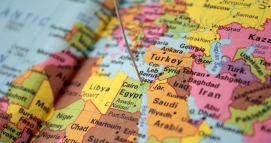 For decades the US has had a hegemonic position in the Middle East. A key country in this respect has been Egypt. However, in recent decades the EU has made itself increasingly felt in the region. Due to enlargements the EU came geographically much closer, and the Internal Market has generated a gravitational pull which goes beyond economic problems. Furthermore, the EU has gradually built up a coherent policy on many fields. The EU has become the “reform anchor” and most important cooperation partner for Egypt. The progress towards increasing Egypt’s “Stake in the Internal Market” places cooperation on an increasingly institutionalized basis.
For decades the US has had a hegemonic position in the Middle East. A key country in this respect has been Egypt. However, in recent decades the EU has made itself increasingly felt in the region. Due to enlargements the EU came geographically much closer, and the Internal Market has generated a gravitational pull which goes beyond economic problems. Furthermore, the EU has gradually built up a coherent policy on many fields. The EU has become the “reform anchor” and most important cooperation partner for Egypt. The progress towards increasing Egypt’s “Stake in the Internal Market” places cooperation on an increasingly institutionalized basis.In terms of military cooperation the US is still the partner for Egypt. But outside the military sphere institutionalized cooperation is comparatively week. In particular the failure of the US to conclude a free-trade agreement has been crucial. But it would be wrong to see the US and EU as rivals. Their roles are rather complementary.
The article explores developments in a long-term perspective. Internal and structural developments have had a heavy impact, but at important junctions ideas and strategies for gaining political legitimacy were powerful factors too
